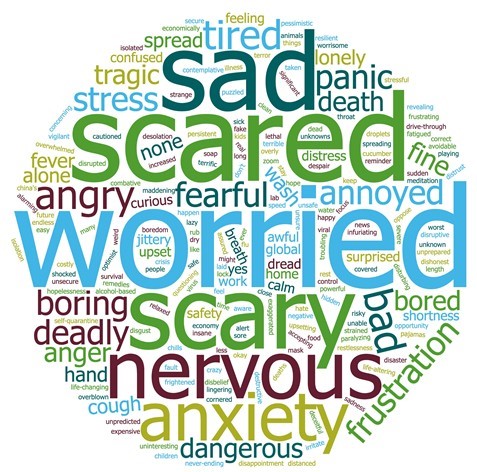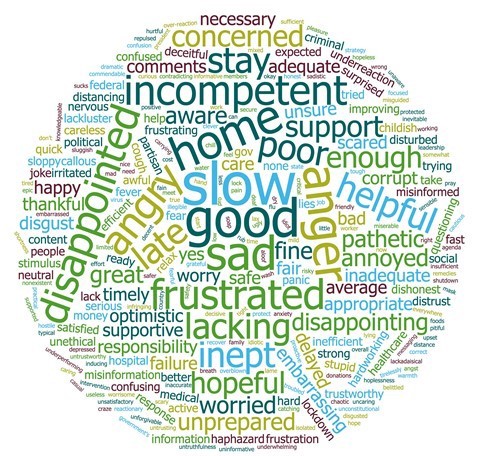The question we’ve been asked the most by clients the past few months is:…
Beware the Anxious Juror
Anxiety, fear, and nervousness about different aspects of everyday life seem endemic among the American public. While most people have learned to cope with their anxieties and fears under the normal demands of their life, few are adept at coping with these anxieties and fear under abnormal circumstances. An abnormal circumstance of particular relevance is that of serving as a juror. Our research suggests that fear or anxiety about an issue can interfere with an individual’s ability to systematically process a persuasive message.
Since trial attorneys rely on persuasiveness to win their case, it is critical that attorneys attend to the anxious juror. Early social science research on persuasion showed that fear campaigns, particularly in the area of health and smoking, were ineffective in producing behavior change. This early research led to research on the relationship between persuasion and anxiety (see, for example, Communication, Cognition and Anxiety, Journal of Social Behavior and Personality, 1990). Our pre-trial surveys, focus groups, and post-trial interviews have also examined persuasion and the anxious juror.
Our early research in major personal injury litigation suggested that when individuals who were anxious about their health and safety, our jury selection models and predictions about their jury behavior were ineffective. We dubbed these anxious jurors as “worriers” and have been cautious about having these individuals sit on major personal injury cases.
Jurors who possess a relatively high level of anxiety about certain topics are in what is described as an aroused state. Test anxiety and the inability to perform in the testing situation is a classic example of the impact of arousal on performance. An aroused state makes it more difficult for individuals to perform complex tasks and also reduces their motivation to process the information.
The dual impact anxiety has of reducing cognitive ability and the motivation to understand information creates hurdles for the trial attorney that often cannot be overcome. Post-trial interviews with jurors high on anxiety often illustrate the fact that the anxious juror prematurely closes themselves off to the arguments. While there are other reasons for jurors to prematurely close off in listening to arguments (strong biases against a party, lack of ability, low self-esteem) anxiety is a less obvious factor but nevertheless one that needs attention.
Attorneys who specialize in areas of civil litigation which involve dramatic events and traumatic injury, such as aviation crashes, dental malpractice or automobile injury cases, may be aware of the detrimental impact that juror anxiety about flying, going to the dentist, or driving has on juror comprehension. Attorneys in other areas of litigation should also be aware of this phenomenon.
Our jury research has identified a number of other areas of litigation where we have discovered at least ten to twenty percent of jurors in urban venues with enough anxiety for attorneys to be concerned about. These areas include: about family finances, worries about environmental pollution; concerns that self or family members have been harmed by exposure to toxic substances; fear of being the victim of a crime and worries about loosing one’s job. All of these areas have direct ties to litigation involving the anxious area.
Recently in high technology cases our research has identified a significant portion of the jury pool who have a fear of technology. These jurors become extremely anxious around technological innovations. They have never programmed their car radio or set their VCR to record. Juror attitudes and experiences on these issues are especially relevant for high tech patent litigation.
Identifying The Anxious Juror
How does one identify the anxious juror? One of the problems with identifying anxious jurors is the fact that the courtroom is an intimidating atmosphere and almost all jurors are hesitant to speak. When asked questions in open court jurors will try to get the process over as quickly as possible and this is often complicated when judges put time pressure on the attorneys. For these reasons, oral voir dire is not as good as other methods for revealing anxious jurors.
To make voir dire more effective in identifying anxious jurors, it is important to make voir dire less threatening. One technique to make it less threatening is to put the anxiety into perspective. For example, one might ask the following question in voir dire: Many people these days are very concerned about their financial situation. How concerned are you?
Another technique for making voir dire on anxiety less threatening is to de-personalize the question. For example, one might ask the following question in voir dire: How concerned are you about the local economy? For those who indicate they are very concerned about the local economy, the attorney needs to probe further by asking the juror why they are concerned about the local economy to determine the degree of their personal anxiety.
One approach being taken throughout the country is the juror questionnaire. Most large toxic tort cases throughout the country rely on juror questionnaires. Asbestos personal injury litigation also often involves use of a detailed pre-voir dire questionnaire. In California there now is a court-approved questionnaire of 34 general questions that can then be supplemented with questions specific to the case. About seventy percent of state court judges in California have used a juror questionnaire in the courtroom.
The questionnaire method allows the attorney to determine whether the juror has anxieties about the issues in a case. For example, in a pollution case, jurors could be asked,
To what extent are you worried that you or family members have been harmed by exposure to toxic substances? or When I hear about another substance that causes cancer it worries me.
Another line of inquiry is to look at behavior patterns. Do jurors behave in such a way that their lifestyle reflects a hypersensitivity to the case issues? Examples of this would include individuals who have driver’s licenses but choose not to drive, or people who do whatever they can to avoid the freeway. In the health area, individuals who take extensive prevention methods in diet, high number of visits to a physician, or been told by their physician not to worry about it.
An acid test for the anxious juror is to determine if they accept a fact that contradicts their anxiety. (For example, an individual who is worried about exposure to toxic substances). Does that person believe that water quality is improving, staying the same or getting worse? Similarly for auto safety, product safety, or health issues. Jurors with high levels of anxiety are not as open to the idea that things can or are improving. Instead they seek out information that adds to their anxiety rather than alleviates their anxiety. Individuals who are high in their fear of crime are more likely to read stories about crime, watch TV shows about crime and refuse to go out at night.
In creating a profile of undesirable juror types, it is clear that the defense would prefer not to have anxious jurors. However, plaintiff attorneys should also take note because an individual with a high level of anxiety is unpredictable and more likely to be a classic “loose cannon” juror. The decision-making process of these types of jurors is often illogical and difficult to predict.



